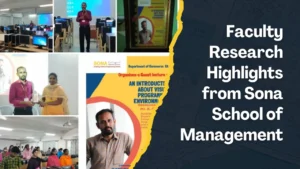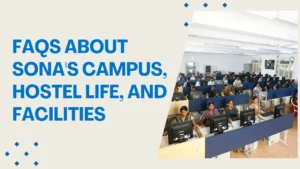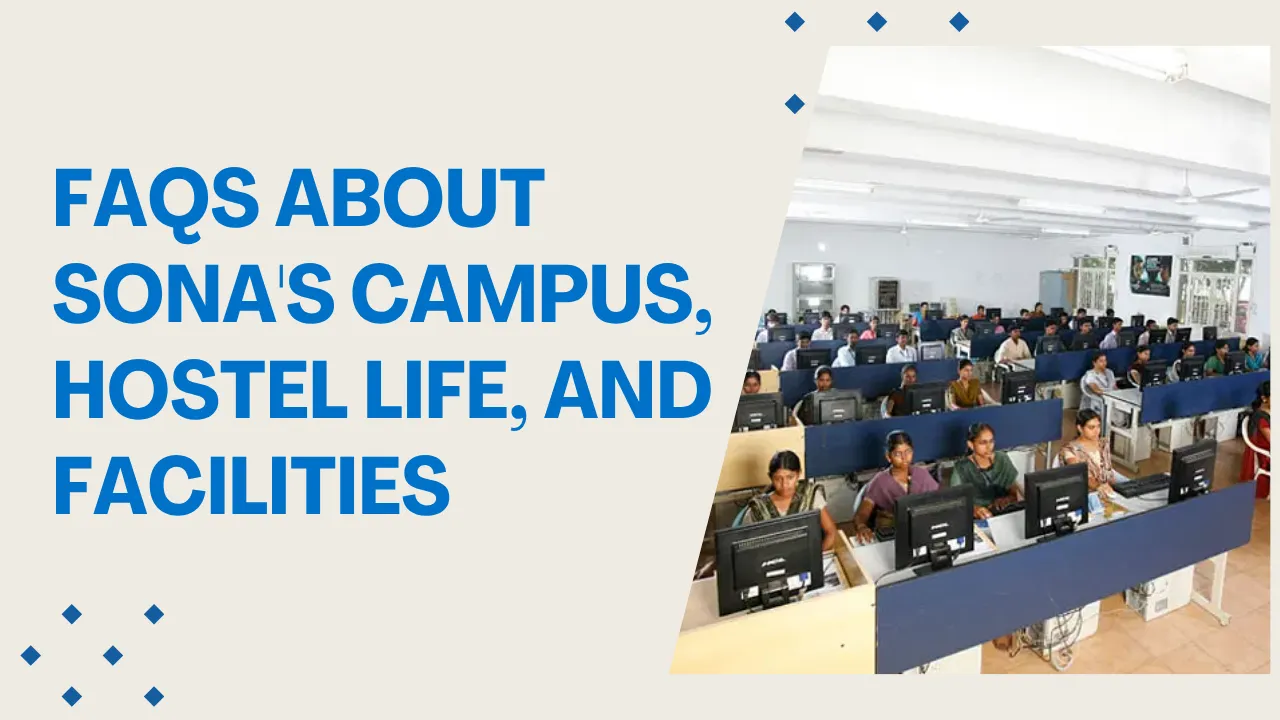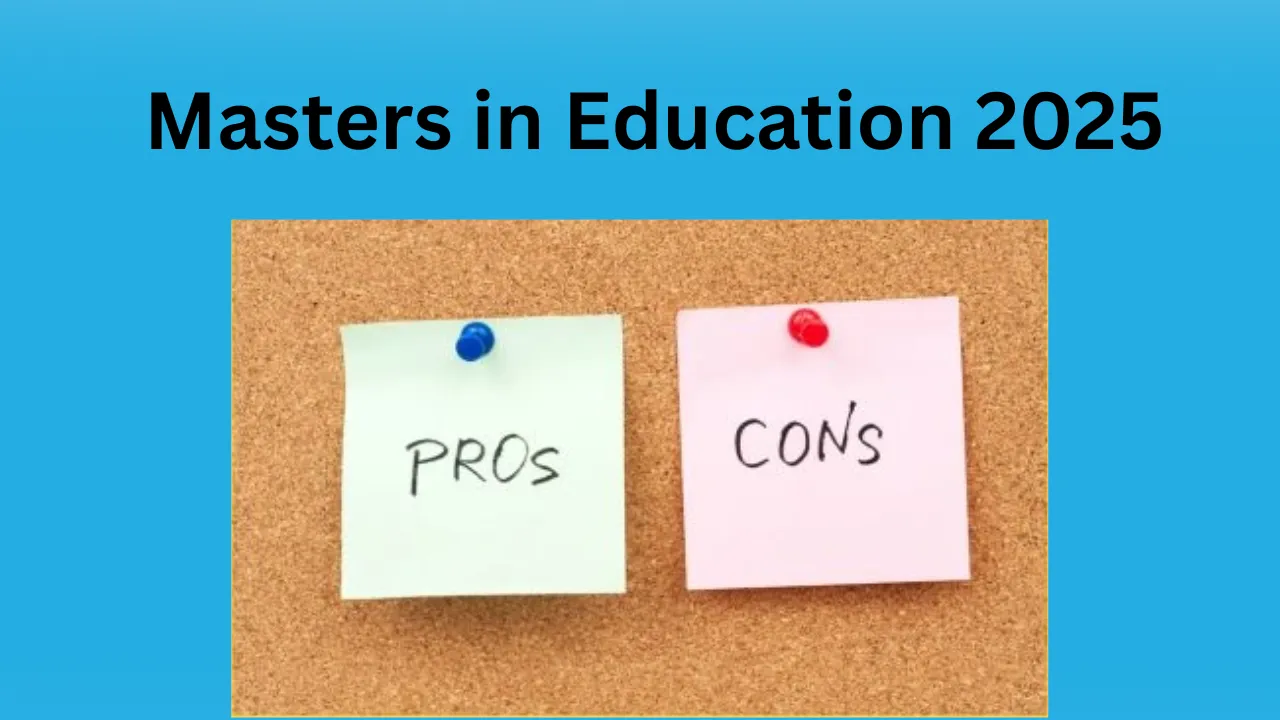Research Opportunities for MBA Students at Sona: Research is the bridge between knowledge and innovation. For MBA students, it opens doors to critical thinking, data-driven decision-making, and deeper understanding of complex business problems. At Sona School of Management, research is not just a component of the curriculum—it is a thriving ecosystem that supports discovery, creativity, and impactful learning.
This article explores the wide range of research opportunities available to MBA students at Sona, including access to journals, participation in industry and academic projects, involvement in innovation hubs, and more. Whether your goal is to enter consulting, analytics, or academia, Sona’s research culture empowers you with the tools to think ahead.
Journals and Academic Publishing
One of the first avenues where MBA students at Sona can engage in research is through academic journals. Students are encouraged to work alongside faculty to write papers on topics such as management innovation, financial trends, marketing strategies, and human resource development.
The process of publishing starts early, with sessions on research writing, proper referencing, and understanding academic ethics. Students develop their research skills by contributing to in-house and external journals and may even be part of journal editorial teams. These publishing experiences help sharpen their analytical and writing skills while enhancing their academic profiles.
Presenting these papers at student conferences or internal symposiums gives them the confidence to defend their work and receive valuable feedback from peers and mentors.
Faculty-Guided Research Projects
Sona places a strong emphasis on collaborative research between faculty and students. Faculty members often guide MBA students on focused research in areas aligned with their expertise—be it operations, strategy, or emerging technologies like AI in business.
Students are invited to co-author papers, assist in literature reviews, and conduct surveys or data analysis as part of faculty-driven research initiatives. These projects are not limited to theory—they address current business challenges and often result in publications or case studies.
This mentorship model ensures that research is grounded in practice and gives students hands-on experience with real research methodologies, tools, and academic rigor.
Industry-Focused Research Projects
Beyond the classroom, Sona creates opportunities for students to engage with real-world problems through live industry research projects. These are typically developed in partnership with corporate partners who offer business issues as project topics.
Students form teams to investigate these challenges—ranging from consumer behavior analysis to market penetration strategies or operational bottlenecks. With faculty as guides and company managers as stakeholders, students apply frameworks, gather and analyze data, and deliver recommendations that can be implemented in real-time.
These live research assignments not only offer exposure to industry operations but also enhance teamwork, communication, and project management skills—core competencies for any MBA graduate.
Capstone Projects with Strategic Impact
In the final phase of their MBA, students complete capstone projects that allow them to deep-dive into a research area of their choice. These projects are a synthesis of their learning, personal interests, and emerging business needs.
From strategy development and business model innovation to sustainability and digital marketing analysis, the capstone is an in-depth exploration of a real-world topic. Students defend their findings before a panel, receiving structured feedback that helps refine their insights.
These capstones serve as strong portfolio pieces and often become the foundation for future roles in consulting, analytics, or entrepreneurship.
Innovation Labs and Research Centers
To support applied research, Sona has set up dedicated innovation spaces and research labs where students can work on focused themes. These include business analytics labs, entrepreneurship cells, and sector-specific centers such as retail or finance.
Students use these labs to experiment with tools like Tableau, R, Python, and Excel modeling. They also explore new business ideas, conduct pilot tests, and simulate market environments. Mentors from industry and academia visit regularly to review ongoing work and suggest improvements.
These labs foster an environment of exploration and problem-solving, essential for developing an innovation-driven mindset.
Research Clubs and Peer Learning
Student-led research clubs at Sona add vibrancy to the research ecosystem. These clubs host sessions on how to read and critique academic articles, explore new business trends, and share ideas for research projects.
They also organize guest talks, panel discussions, and informal “research cafes” where students present work in progress and receive feedback. Such platforms foster peer learning, help students build confidence, and stimulate creativity in framing and exploring research problems.
Participation in Conferences and Seminars
Sona encourages students to present their research at national and international conferences. These events allow students to learn from other researchers, get exposed to new methodologies, and network with scholars, entrepreneurs, and industry experts.
Whether presenting a marketing case study or an HR transformation model, students gain valuable experience in public speaking, defending arguments, and engaging in professional dialogue.
This visibility often leads to opportunities for internships, higher studies, or further collaboration, especially for those considering research or academic careers post-MBA.
Exposure to Funded and Government Research
Some students also contribute to larger research initiatives at Sona, including those funded by industry bodies or government departments. These projects deal with areas like financial literacy, rural development, education impact studies, and SME performance assessments.
Students involved in these studies often work on data collection, interviews, and data processing. They get to understand policy-making, large-scale research design, and institutional reporting—skills that are valuable in consulting, public policy, and research-driven organizations.
Research Tools and Skill Development
Research at Sona is supported by structured training in data and analytics tools. Workshops and labs help students become proficient in:
- Statistical analysis using SPSS and Excel
- Data visualization using Power BI and Tableau
- Qualitative research techniques like interviews and thematic coding
- Research design, sampling methods, and hypothesis testing
These technical skills make MBA graduates more competitive and equip them to contribute meaningfully to research-based roles across industries.
Paving the Way to Doctoral Studies
For students with long-term academic goals, Sona provides a solid foundation for doctoral programs. Faculty mentors assist with research proposal writing, methodology understanding, and preparation for entrance exams or interviews.
Students who have completed major projects or published papers often use this experience to apply for PhD programs in India and abroad. With the support of recommendations and the institutional research record, Sona alumni have successfully transitioned into full-time research and teaching careers.
Final Thought
Research is more than an academic requirement—it is a journey of exploration and transformation. At Sona School of Management, MBA students are not just taught to manage but are trained to question, explore, and innovate. From publishing papers to solving live business problems, the opportunities are diverse and enriching.
If you’re someone who’s curious, analytical, and ready to challenge the norm, Sona offers a platform where your questions matter. Interested in contributing to impactful research? Start exploring with us today.

















